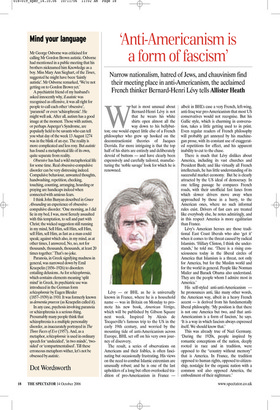Mind your language
Mr George Osborne was criticised for calling Mr Gordon Brown autistic. Osborne had mentioned in a public meeting that his brothers nicknamed him Knowledge as a boy. Miss Mary Ann Sieghart, of the Times, suggested he might have been ‘faintly autistic’. Mr Osborne remarked, ‘We’re not getting on to Gordon Brown yet.’ A psychiatrist friend of my husband’s asked innocently why, if autistic was recognised as offensive, it was all right for people to call each other ‘obsessive’, ‘paranoid’ or even ‘schizophrenic’. He might well ask. After all, autism has a good image at the moment. Those with autism, or perhaps Asperger’s Syndrome, are popularly held to be savants who can tell you what day of the week 13 August 1274 was in the blink of an eye. The reality is more complicated and less rosy. But autistic has found a metaphorical life of its own, quite separate from reality.
Obsessive has had a wild metaphorical life for some time. Real obsessive-compulsive disorder can be very distressing indeed. Compulsive behaviour, unwanted thoughts, handwashing, repetition, checking, touching, counting, arranging, hoarding or praying are handicaps indeed when connected with anxious fears.
I think John Bunyan described in Grace Abounding an experience of obsessivecompulsive disorder. ‘One morning, as I did lie in my bed, I was, most fiercely assaulted with this temptation, to sell and part with Christ; the wicked suggestion still running in my mind, Sell Him, sell Him, sell Him, sell Him, sell Him, as fast as a man could speak; against which also, in my mind, as at other times, I answered, No, no, not for thousands, thousands, thousands, at least 20 times together.’ That’s no joke.
Paranoia, in Greek signifying madness in general, was narrowed down by Emil Kraepelin (1856–1926) to disorders entailing delusions. As for schizophrenia, which contains elements meaning ‘split mind’ in Greek, its psychiatric use was introduced in the German form schizophrenie by Eugen Bleuler (1857–1939) in 1910. It was formerly known as dementia praecox (as Kraepelin called it).
In any case, psychosis involving paranoia or schizophrenia is a serious thing. Presumably many people think that schizophrenia is a multiple personality disorder, as inaccurately portrayed in The Three Faces of Eve (1957). And, as a metaphor, schizophrenic is used in ordinary speech for ‘undecided’, ‘in two minds’, ‘twosided’ or ‘compartmentalised’. Till these erroneous metaphors wither, let’s not be obsessed by autistic.
Dot Wordsworth


































































































 Previous page
Previous page